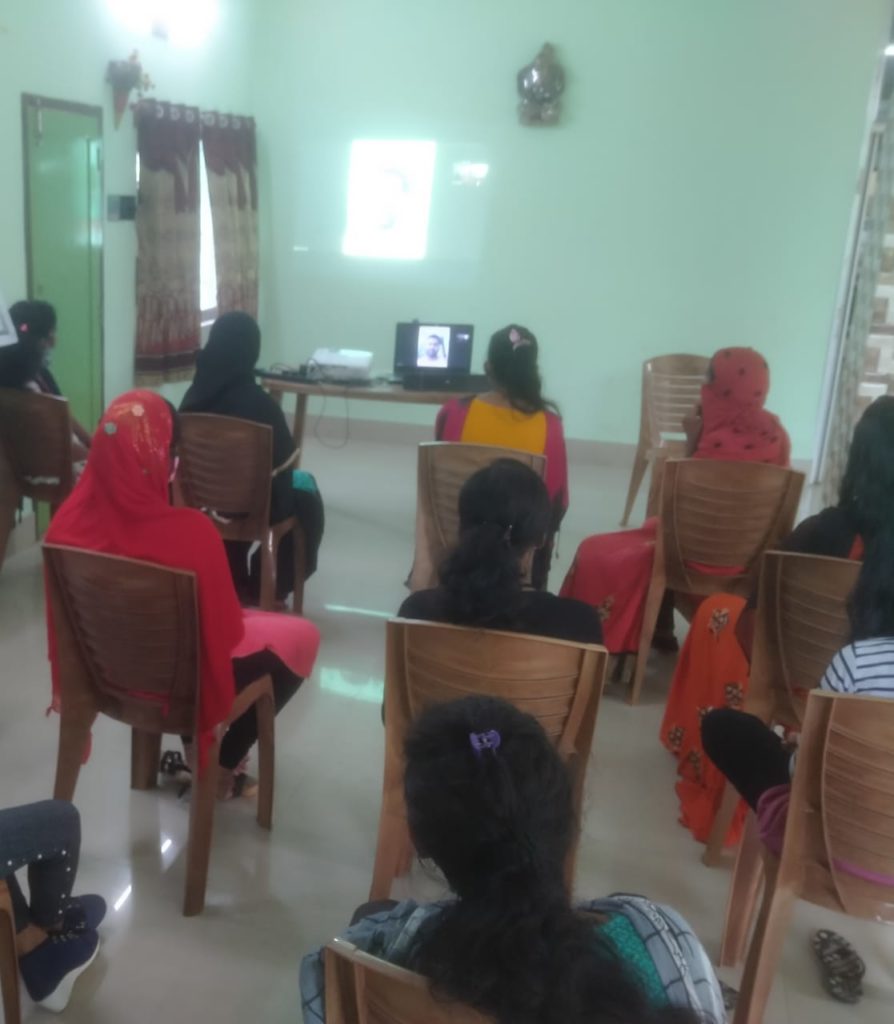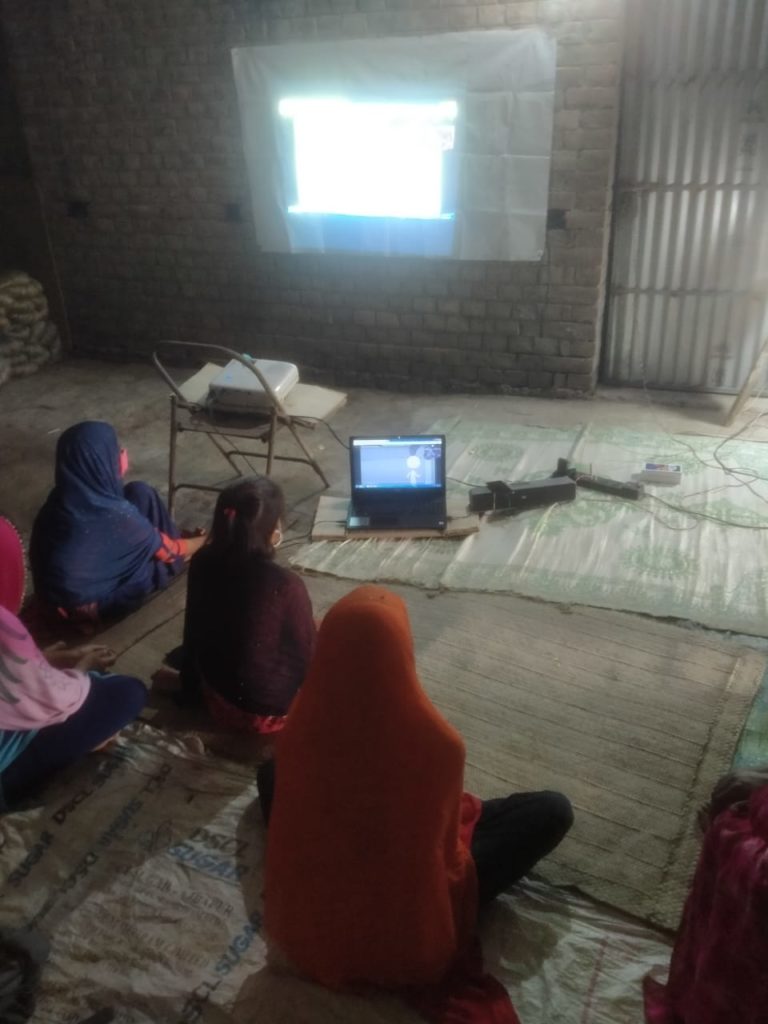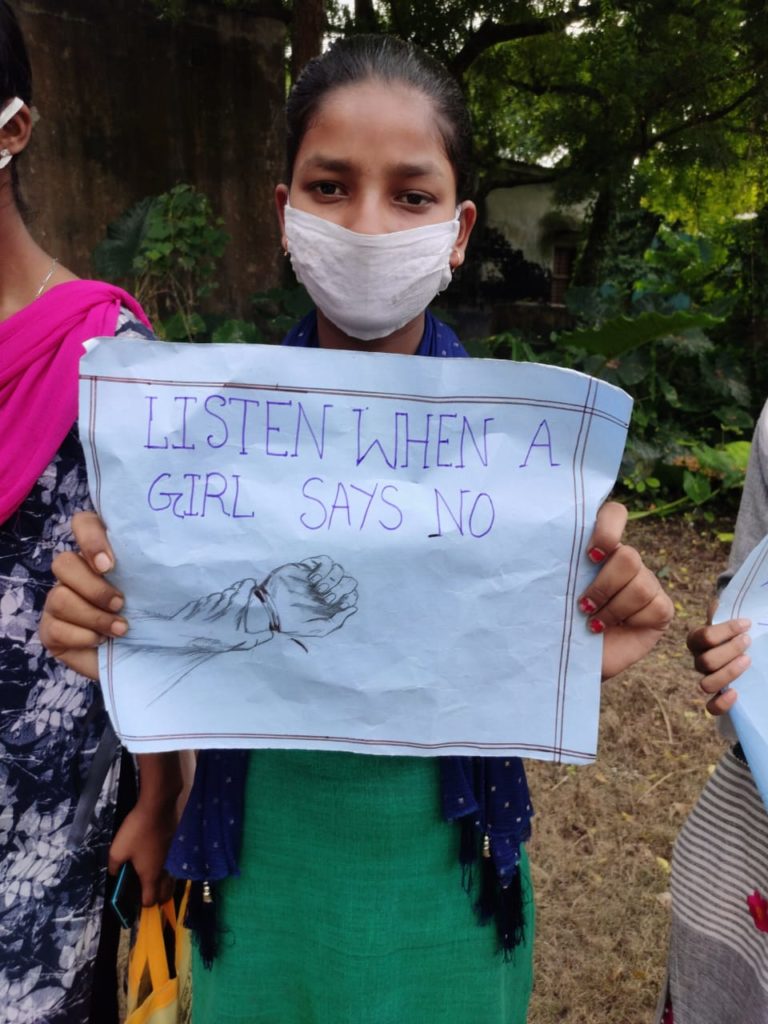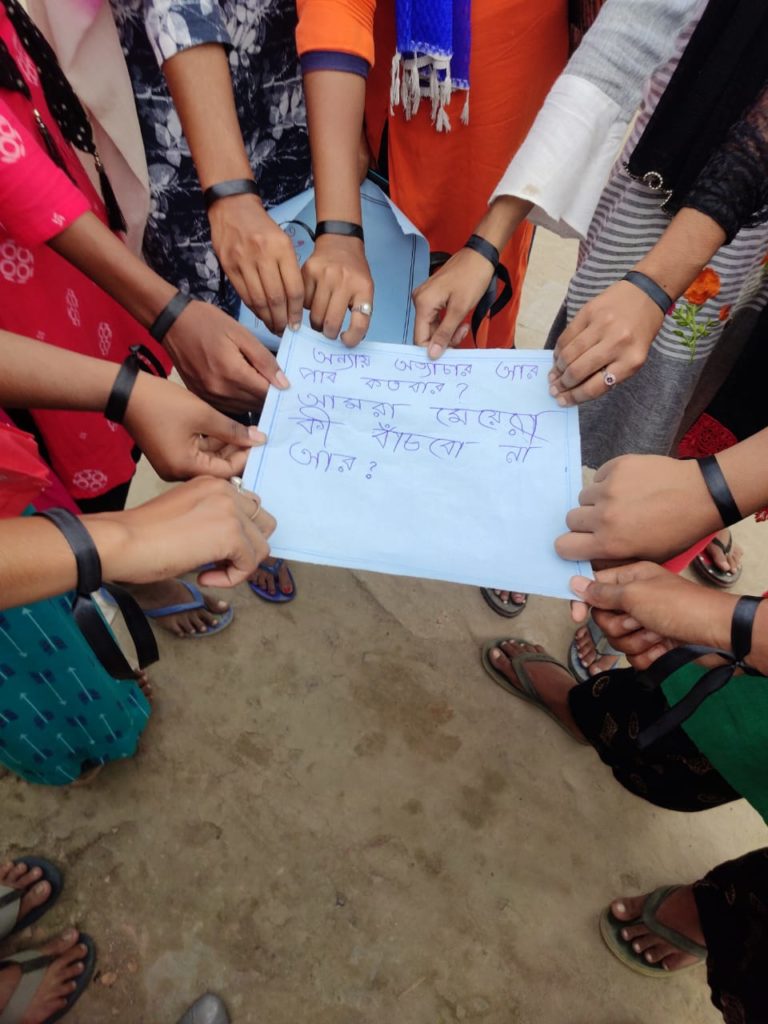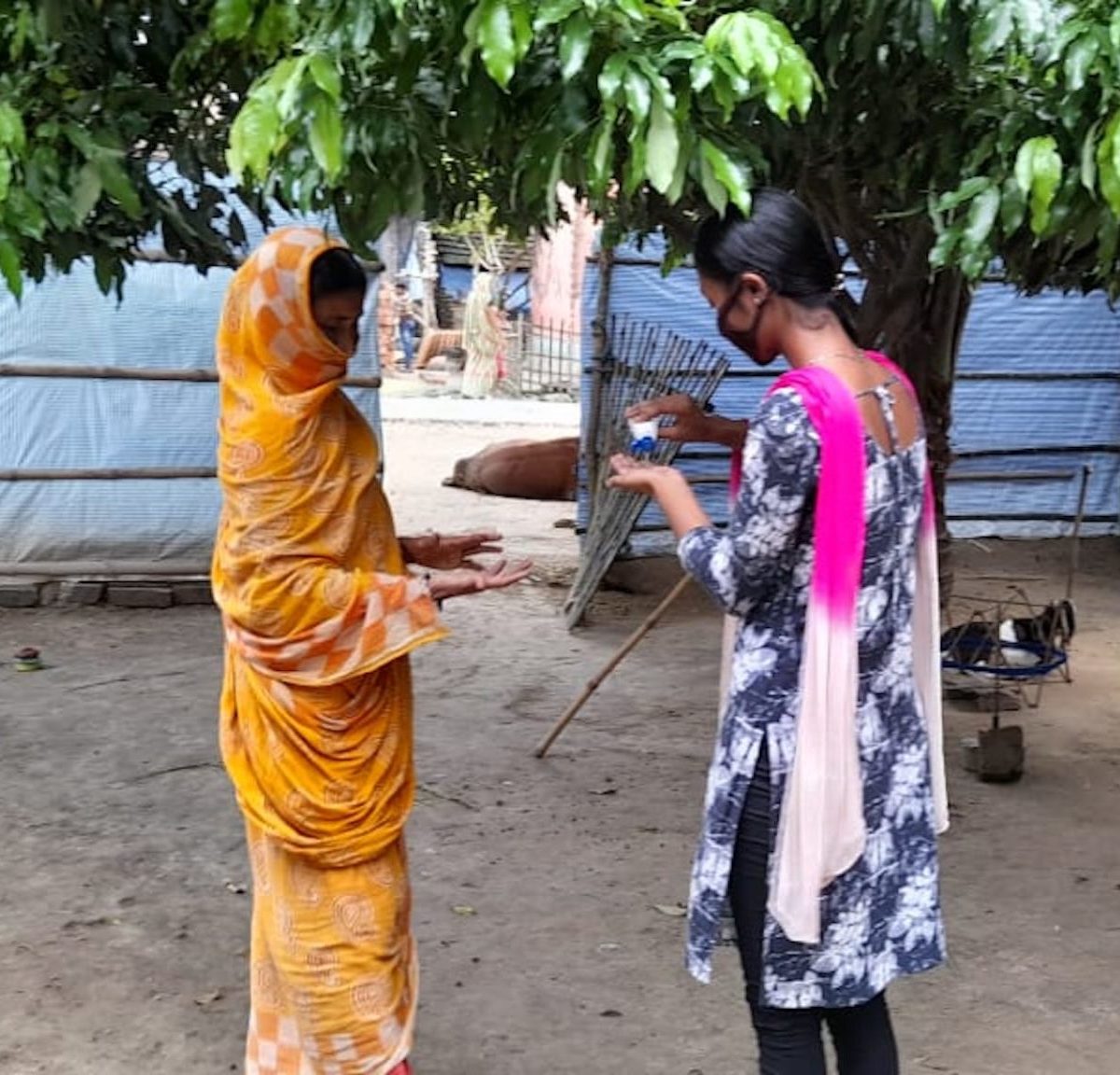
Blog
We have to think of ways towards young women’s empowerment. We have to take this seriously.
When She Leads: Deblina
December 7, 2020
Reading Time: 14 minutesThis interview is part of our When She Leads: From the Front Lines series. Learn more.
Deblina is a District Coordinator in the Murshidabad communities with our partner site Jabala in West Bengal. Deblina was interviewed by Program Officer Kendra Nicolai and Donor & Program Associate Sabah Siddiqui.
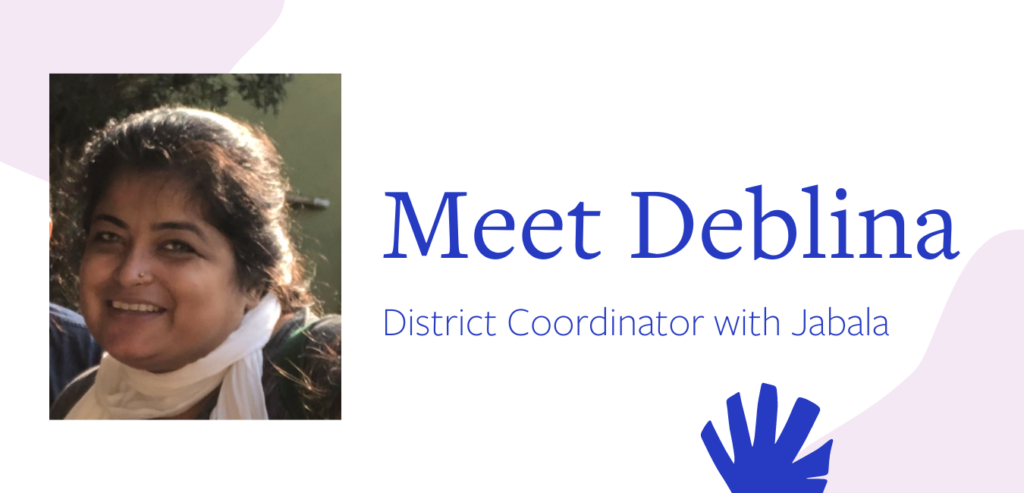
What has girl leadership looked like during a pandemic up to this point?
At the beginning of the pandemic situation we were thinking, “How are we going to be able to communicate with the girls?” We were not thinking just of peer leaders or leadership, but especially about our outreach to all girls in the community. It was the young women who were peer leaders who gave us recommendations. We connected with them through phone calls mostly because Zoom wasn’t working properly in Murshidabad.
Later, 3 to 4 peer leaders could connect through Zoom app during May-June. At that time, the girls pointed out that many people from Murshidabad, which is a rural place, are migrant laborers. They work in places like Kerala and Delhi but when the pandemic happened, the city workplaces all shut down. They live in tenant homes in the cities, but they were not allowed to stay there. So, the peer leaders asked how can they come home? Buses weren’t working, there is no transportation, so how do they get home? Everyone realized, they were walking.
This situation is a burning issue in India. There was a slogan during this time: “When India works, Bharat walks”. When a class of Indian are busy working from home, the marginalized people in India are forced to walk home, some 800 miles to return to their villages because there is no work.
Murshidibad is a rural district in West Bengal that many people migrate away from to look for work in major cities. When the pandemic forced a shutdown across India, these migrant workers lost their jobs, their housing and were forced to return home, in this case, walking up to 800 miles home to Murshidibad.
The peer leaders wanted to help the community and told me, “We don’t know what we will do tomorrow. What will we do?” They suggested giving out rations of food. So, Jabala organized this campaign, listening to the peer leaders. The peer leaders helped with distribution of food and hygiene/ sanitation kits which included masks. This project was brought about because of the young women’s initial concern and organized by them. Jabala helped bring their vision to life.
We also found that online classes for students began in June in India, but it wasn’t working well. The teachers were not comfortable teaching virtually. Network was poor and girls were lacking resources and motivation. This created a challenge of massive drop out which we knew would result in more early, forced child marriages.
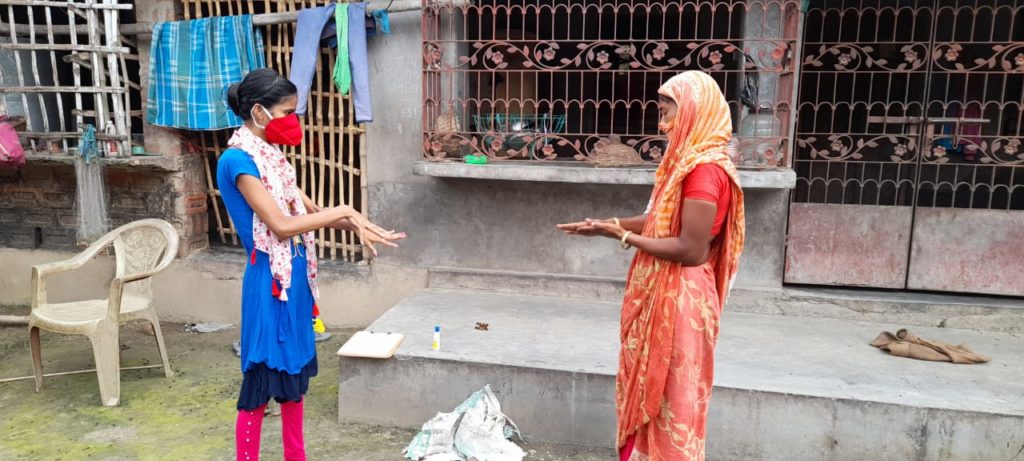
So far, there have been 5 early, forced marriage cases in our locality within 2 blocks of Murshidibad. Communication was minimal during this time. Due to the pandemic lockdown, police would not let you leave the house, so we could not help or try to stop the marriages. During the pandemic early, forced marriages is only the young woman and groom and that’s all – no big ceremony. Everything is done in a hidden way. The issue is alarming at that time. Our peer leaders helped – they would give information to me, then I helped give information to block officials who would then try to intervene and prevent the marriage from happening illegally.
In terms of programming, we had to remodel the peer leader sessions from in-person to online. We have remodeled the sessions, yet the components are the same. Now it is more task-oriented. For example, if I am giving training on leadership, we have 1 hour for a leader-facilitated presentation and interactive session, 1 hour for participant tasks, and post session the participants will have homework. We are trying to help in this situation.
Girls are so interested in the ways we have changed the sessions. There are 2 ways of participating. Because not every girl has access to a mobile smart phone, we have arranged a safe, social distanced group learning environment. We have a group of 10-12 girls who meet together at a Jabala classroom location. One is the “protector” who is tasked with sanitizing the place first and providing masks to everyone who joins. They use a projector to see the programming on a screen, and sit with physical distancing in the classroom so they are able to conduct the session. The second option is that Jabala has access to 10 mobile phones that we can alternatively provide to a girl on a use basis to connect for a session. The Zoom app is installed so they can connect. After they have joined the session, then the girl is responsible for returning the phone back to Jabala. Still this is not always the best option if their locality has poor network.
What have you learned from this experience?
Well, I have learned that this situation is changing constantly. And everything has been digitized. This is the scenario in all of India, not just Jabala. To cope with this situation, we need to sensitize and prepare the girls and boys. The pandemic lockdown has increased the vulnerability of trafficking and early, forced marriage. In Murshidibad, we have rescued a girl from Mumbai – she was trafficked. The train is not going, but still the traffickers are running. Once the train starts moving again, there will be a huge problem with trafficking. This period is so important to inform the government to stop trafficking and early, forced marriage. We must keep raising the issues because families continue to experience unemployment which makes them even more vulnerable to make the choice to force a daughter to marry early or send her looking for work.
We have to think of ways towards young women’s empowerment. We have to take this seriously. At Jabala, we have programs that help girls develop vocational training, and after a period of time, they get placement in a job. These kinds of schemes need to be serious; they need to be fruitful. We need to champion employment opportunities – it is critical to stop the issue of trafficking and early, forced marriage. It is also crucial for our society to sensitize boys. Early, forced marriage is not just girls getting married as children, it’s boys and men too. Early, forced marriage is a medium in which trafficking is accomplished. Below 18 years of age, you have no right to say yes or no because you belong to your parents. Our Jabala team plans to focus on how we can address this in the upcoming year.
What have the young women taught you during this time?
This is a very interesting question. I have learned to be much more flexible, mentally. I was panicking – feeling like I could not foresee anything, how can this be possible. Then, the peer leaders started sorting things and coming to me with solutions, saying we need to do these things. This is when I learned, “Yes!”, we need to be flexible. Things change, nothing is permanent, we need to cope and adapt. I’ve learned how to adapt. They’re the main people facing the problem, till then they were hoping and dreaming. I learned from them that I cannot give up. We must be flexible and adapt for them.
I shared we have remodeled the peer leader session. I got the ideas about how to shift from the peer leaders only, especially with regard to the changes made on how to conduct session, because dealing with them I have learned that lecture-based session is difficult and not accepted. We need a way of communicating that worked for the peer leaders. I’ve learned I need to provide them with tasks, I monitor, and then can find out the outcome. This idea has come from learning from our peer leaders and changing of the mind has come out from interacting with them. They are full of positive vibes, that’s what I have learned and do enjoy. At many times, we adults find ourselves pessimistic. These youth are so positive. The say: “Yes di, we can do it! Don’t worry, we will get it done!”.
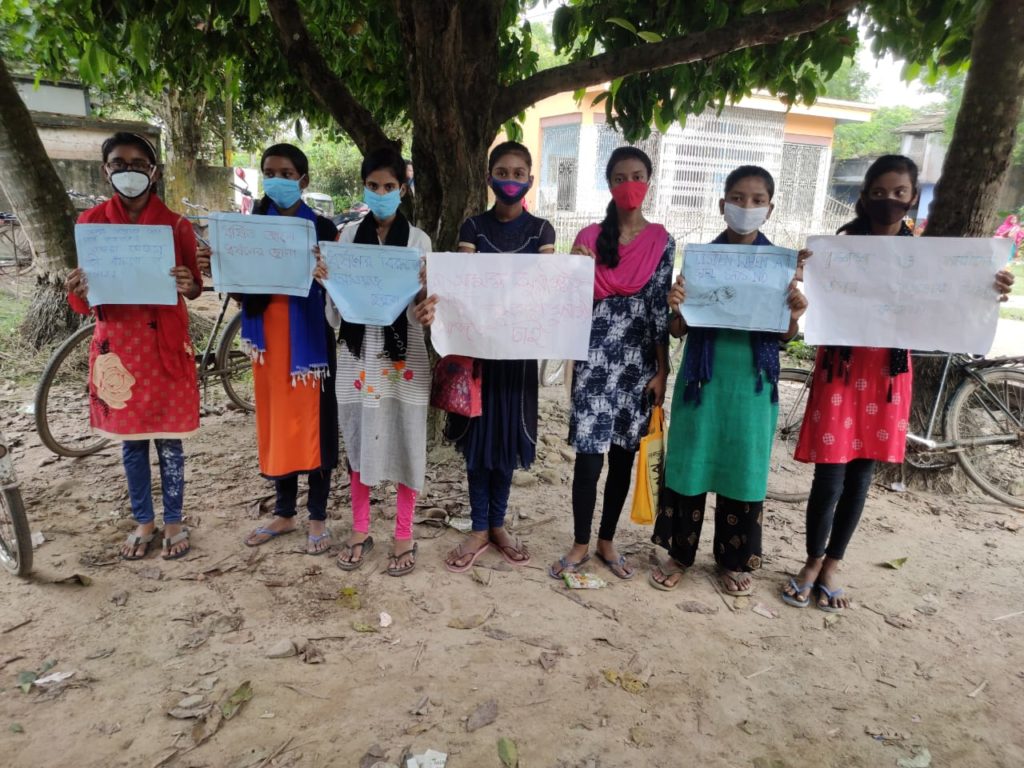
What does it mean for you to lead in this moment, how has this been for you?
To me the journey is as a combination of teaching and learning. Empowering young women is the indispensable factor which I believe can eradicate all social evils. The journey is tough. It reveals all the grey shades of the community, as well as the oppressive systems but formulating strategies to address the issues means everything to me.
What do you and your community expect for the upcoming year?
Our peer leaders have started a program to address safe migration because the government has suspended these notifications. 5-6 peer leaders go together to a community and speak at a safe distance to people at their homes. Their goal is to inform people about the pandemic migration situation, as well as provide some basic safety and wellness tips. Because community meetings are not possible, the peer leaders have voluntarily decided to continue informing their community through this program.
70% of people in Murshidabad are migrant labors, but there is no environment here to find work. This is the issue that the peer leaders are upholding. We are investigating the potential of organizing local business so they can stay and find work here. We are also asking the government to help with communication for different places.
Also, Murshidabad has initiated a new backup education center in 2 blocks outdoors. We have organized 10 teachers in both blocks, they are taking sessions and classes with our adolescent group. To be frank, this is a safe place for adolescent girls to come, meet their friends and learn. We started in September; they have been included. Due to child marriage and drop out being an issue – we have done this. Not more than 12 students in one batch due to social distancing. College was always a safe place, but they cannot go now, so we are providing them with a safe place.
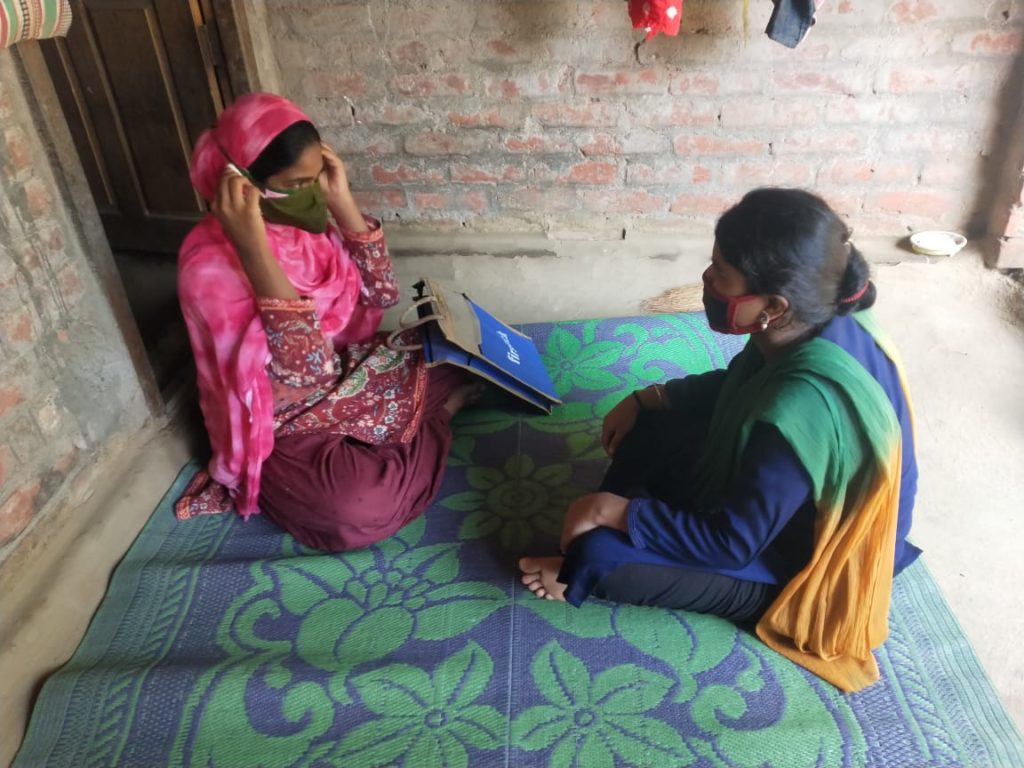
There are risks involved with girls raising their voice and being leaders in their communities. What are they?
1 month ago, an incident happened. Some peer leaders from one of our blocks in Murshidabad, went to resist an early, forced marriage. They gave us the information and the peer leaders went. We don’t ever disclose the source of information because it’s risky. Somehow, the family found out about our peer leaders and threatened if the peer leaders tried to intervene, they would be raped. The next day, we visited the police station and filed a complaint. This is the kind of threat we get. If police administration won’t do something, this is a problem for us. In this case, the admin went to the place and took care of the issue.
The peer leaders are 15-18 years old; this is a very tender age. They are brave, sometimes they do things spontaneously. Whenever they are doing a courageous job–sensitizing the community or speaking against an issue–their families react negatively and restrict them from leaving the house. They say, “Oh now you are becoming a leader, let’s get you married.”
Jabala knows these families, these young women have been in our programs for many years, they are not our “informers”. Even if they were, the young women are trying to help peers–other young women–and are doing this for the community. But ultimately it is the job of the police administration to help stop these illegal early, forced marriages. But how do our peer leaders help if now they are at risk of early, forced marriage happening to them too? This is the main challenge we are facing now a days. Because unemployment is a burning agenda, and these families are more vulnerable, the young women are at higher risk. The families think “Now you will get married.” This is such an obstacle of the peer leaders.
What challenges are you experiencing as a leader personally? How are you overcoming these?
Patriarchy within the system is no doubt one of the vital challenges which we have to face every day. Patriarchy which prevails within females is more dangerous as the issue takes the shape of a double-edged sword. In the pandemic with schools shut down, community vulnerabilities substantially increased. We are seeing young women themselves who think they want to get married to get rid of the suffocating environment of the family or run away with a guy–that’s more challenging to prevent. To overcome all these challenges, we continue field visits even in the pandemic situation with all our safety precautions, as well as advocating to the government, increased interactions with communities, and strategic, creative plans like setting up the backup education center which result in safe spaces for girls.
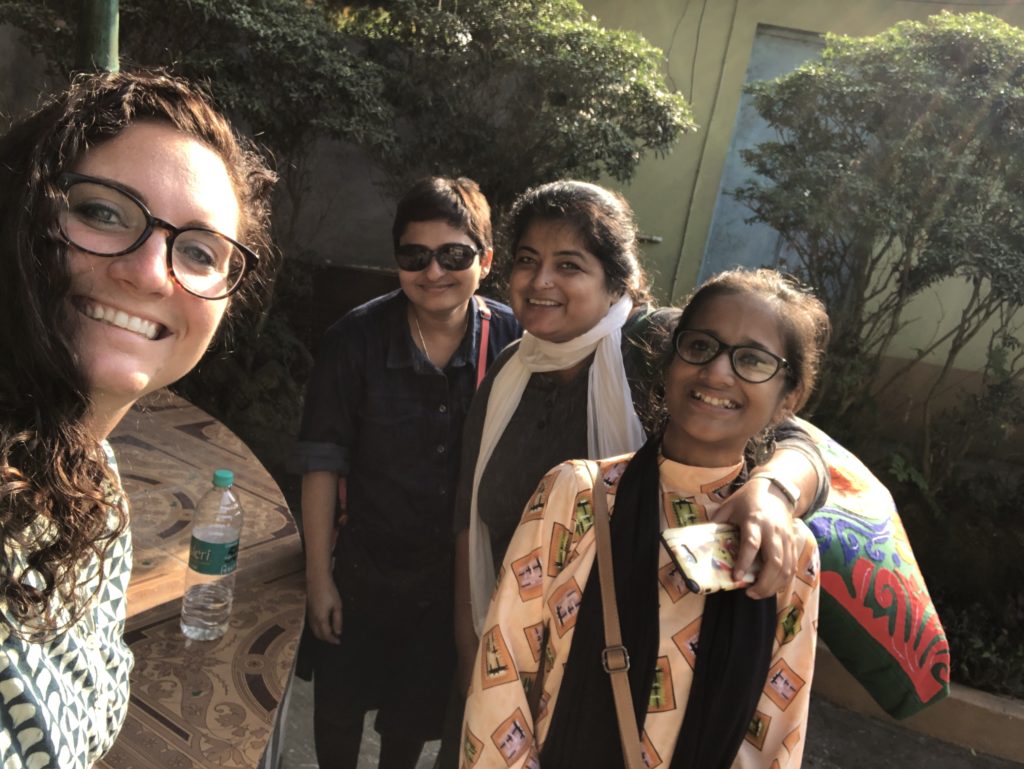
How do you feel Shadhika is empowering young women leaders? What has this looked like?
The way Shadhika has been beside us, it is a wonderful journey. Both organizations are working together, the girls know this and enjoy this. Through Shadhika, they are encouraged and they have the scope to learn. We expect Shadhika will continue this journey. All of our processes need to be transformed into virtual. We are formulating vocational training modules, and would be interested in Shadhika’s support in this area. Life skills training is crucial. We can only empower the young women if we can continue to strengthen and grow their leadership and confidence.
What advice do you have for other women leading from the frontlines?
My advice is that more women should come forward in leadership. And yes! Each and every woman has the capacity to do it in her own way. We need to learn from each other.
About Early, Forced Marriage
Shadhika partners with Girls Not Brides, a global partnership of more than 1500 civil society organizations committed to ending child marriage and enabling girls to fulfill their potential.
Girls Not Brides defines child or early, forced marriage as “any formal marriage or informal union where on or both of the parties are under 18 years of age.” Each year, 12 million girls are married before the age of 18. That is 23 girls every minute. Nearly 1 every 3 seconds. Child marriage or marriage without the free and full consent of both spouses is a human rights violation and is not in line with several international and regional agreements.
Girls Not Brides is a leading world resource. Learn more about this pressing issue for young women in India and globally.
Read more
